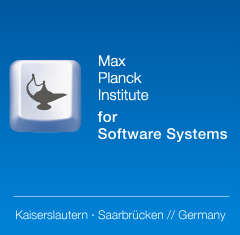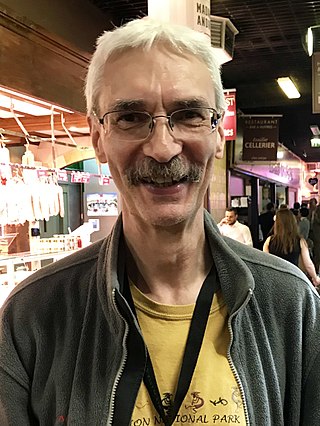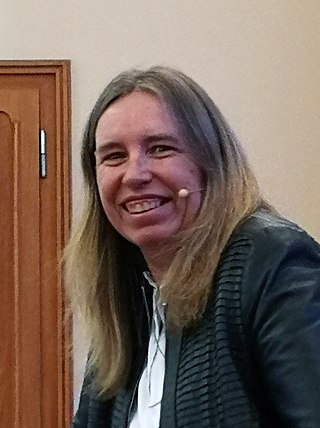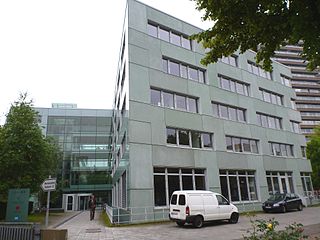Related Research Articles

The Max Planck Society for the Advancement of Science is a formally independent non-governmental and non-profit association of German research institutes. Founded in 1911 as the Kaiser Wilhelm Society, it was renamed to the Max Planck Society in 1948 in honor of its former president, theoretical physicist Max Planck. The society is funded by the federal and state governments of Germany.
The Max Planck Institute for Informatics is a research institute in computer science with a focus on algorithms and their applications in a broad sense. It hosts fundamental research as well a research for various application domains.

Dagstuhl is a computer science research center in Germany, located in and named after a district of the town of Wadern, Merzig-Wadern, Saarland.

Saarland University is a public research university located in Saarbrücken, the capital of the German state of Saarland. It was founded in 1948 in Homburg in co-operation with France and is organized in six faculties that cover all major fields of science. In 2007, the university was recognized as an excellence center for computer science in Germany.

The Gottfried Wilhelm Leibniz Prize, or Leibniz Prize, is awarded by the German Research Foundation to "exceptional scientists and academics for their outstanding achievements in the field of research". Since 1986, up to ten prizes have been awarded annually to individuals or research groups working at a research institution in Germany or at a German research institution abroad. It is considered the most important research award in Germany.

The Max Planck Institute for Software Systems (MPI-SWS) is a computer science research institute co-located in Saarbrücken and Kaiserslautern, Germany. The institute is chartered to conduct basic research in all areas related to the design, analysis, modelling, implementation and evaluation of complex software systems. Particular areas of interest include programming systems, distributed and networked systems, embedded and autonomous systems, as well as crosscutting aspects like formal modelling and analysis of software systems, security, dependability and software engineering. It joins over 80 other institutes run by the Max-Planck-Gesellschaft, which conduct world-class basic research in medicine, biology, chemistry, physics, technology and the humanities.

Gerhard Weikum is a German computer scientist and Research Director at the Max Planck Institute for Informatics in Saarbrücken, Germany, where he is leading the databases and information systems department. His current research interests include transactional and distributed systems, self-tuning database systems, data and text integration, and the automatic construction of knowledge bases. He is one of the creators of the YAGO knowledge base. He is also the Dean of the International Max Planck Research School for Computer Science (IMPRS-CS).
Wolfgang Gentner was a German experimental nuclear physicist.

Susanne Albers is a German theoretical computer scientist and professor of computer science at the Department of Informatics of the Technical University of Munich. She is a recipient of the Otto Hahn Medal and the Leibniz Prize.
Hein Kötz is a German jurist, former Director of the Max-Planck-Institute for foreign and international private law (MPI-PRIV), the Bucerius Law School and Vice President of the Deutsche Forschungsgemeinschaft (DFG).
Frank Neese is a German theoretical chemist at the Max Planck Institute for Coal Research. He is the author of more than 440 scientific articles in journals of Chemistry, Biochemistry and Physics. His work focuses on the theory of magnetic spectroscopies and their experimental and theoretical application, local pair natural orbital correlation theories, spectroscopy oriented configuration interaction, electronic and geometric structure and reactivity of transition metal complexes and metalloenzymes. He is lead author of the ORCA quantum chemistry computer program. His methods have been applied to a range of problems in coordination chemistry, homogeneous catalysis, and bioinorganic chemistry.

Anja Feldmann is a German computer scientist.

Reinhard Wilhelm is a German computer scientist.
Albrecht Schmidt is a computer scientist best known for his work in ubiquitous computing, pervasive computing, and the tangible user interface. He is a professor at Ludwig Maximilian University of Munich where he joined the faculty in 2017.

The Max Planck Institute for Meteorology is an internationally renowned institute for climate research. Its mission is to understand Earth's changing climate. Founded in 1975, it is affiliated with the Max Planck Society and the University of Hamburg, and is based in Hamburg's district of Eimsbüttel. Its founding director was the Nobel laureate Klaus Hasselmann. The current managing director is Bjorn Stevens.

Thomas Lengauer is a German computer scientist and computational biologist.
The International Max Planck Research School for Organismal Biology founded in 2009, was a structured doctoral program of the former Max Planck Institute for Ornithology in Seewiesen (Pöcking) and the Department of Biology of the University of Konstanz. In October 2010, the first 30 doctoral students began their research, and until 2023, 105 have successfully graduated. The faculty consisted of over 35 leading scientists with a focus on behavioral science, ecology, evolutionary biology, physiology and neurobiology of the former Max Planck Institute for Ornithology and the Department of Biology at the Universität Konstanz. The goal of the IMPRS for Organismal Biology was to provide first-class training and education to doctoral students from around the world, in a stimulating, world-renown research environment. The school officially ended in 2023.
Zeynep Akata is a professor of computer science at the University of Tübingen where she leads the Explainable Machine Learning group. Akata is also a senior research scientist at the Max Planck Institute for Intelligent Systems, Tübingen.
Christian S. Jensen is a Danish computer scientist who is a professor at Aalborg University.
Gjergji Kasneci is a German computer scientist known for his contributions to the field of Artificial Intelligence, specifically, knowledge base construction, semantic search, and data science. He is a full professor and heads the chair for Responsible Data Science at the Technical University of Munich (TUM), and is a core member of the Munich Data Science Institute. Before his current appointment, Kasneci has held multiple positions in academia and industry, including the role of Chief Technology Officer (CTO) at Schufa Holding AG and an honorary professorship at the University of Tübingen.
References
- ↑ "Schiele, Bernt". www.mpg.de. Retrieved 2019-10-29.
- ↑ "Max-Planck-Institut für Informatik: Prof. Dr. Bernt Schiele wird neuer Direktor am Max-Planck-Institut für Informatik in Saarbrücken". www.mpi-inf.mpg.de. Retrieved 2019-10-29.
- ↑ "Bernt Schiele". alumni.media.mit.edu. Retrieved 2019-10-29.
- ↑ "Max-Planck-Institut für Informatik: Bernt Schiele". www.mpi-inf.mpg.de. Retrieved 2019-10-29.
- ↑ "IAPR - IAPR Fellows". www.iapr.org. Retrieved 2019-10-29.
- ↑ "IEEE Computer Society Members Elevated to Fellow for 2017 | IEEE Computer Society". 9 April 2018. Retrieved 2019-10-29.